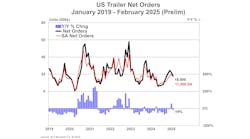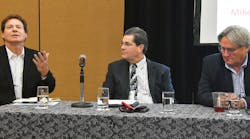An NTDA panel discussion that generates more questions than answers might not be what some attendees had hoped for, but if the session on GHG Phase 2 and the California Air Resources Board California was any indication, plenty of people in the trailer industry are keenly interested in the topic, if not completely confused. The consensus takeaway: Be patient.
The dilemma, as explained by Mike Tunnell, director of energy and environmental affairs for the American Trucking Associations, is this: The Truck Trailer Manufacturers Association petitioned EPA and NHTSA to reconsider GHG 2, arguing that trailers should not be regulated as a “motor vehicle” and that the standards are “arbitrary and capricious” because they don’t accurately reflect the way trailers operate in the real world. But if TTMA succeeds, then CARB is most ready and willing to implement rules of its own. A plan based on federal GHG 2 standards is already in the works for 2020—and other states will likely sign on.
“We don’t know where they will end up,” Tunnell said. “With the uncertainty surrounding the federal rule, it’s a distinct possibility that if that [federal rule] were to go away, other states would adopt the California rule. It’s not that hard of a sell. A number of states have plans to reduce GHG levels, so I wouldn’t be surprised.”
But California doesn’t need to be encouraged to add any more regulations, explained Mike Shuemake,, president of Central Valley Trailer Repair, a former NTDA chairman, and an outspoken critic of his state’s difficult business climate. Indeed, the state has a hard time enforcing the trailer regs it already has on the books, Shuemake explained.
“Today was the first day that I’ve heard that anybody has ever been inspected, fined, or ticketed for non-compliance with the SmartWay rule,” Shuemake said. “The problem is there’s only about 25 inspectors in the state that are inspecting every CARB rule that’s out there—and there’s a bunch of the them. There’s very little enforcement, and there’s so many different exemptions, I’m not positive that any CARB inspector could go to a trailer and figure out whether it’s compliant or not.”
Another source of confusion: Currently, vendors can’t get beneficial new technology certified under GHG 2, noted Larry Adkins, senior manager at Wabash National. The federal government has shut down its program, pending the outcome of the GHG rule review. And while CARB has announced plans for a certification facility, it’s not up and running.
“Today there’s no means for certification in the regulation,” Adkins said. “Right now, we’re at the point where you can’t do much of anything.”
Tunnell added CARB is currently being “very cautious” in the wake of litigation that “caught them moving rulemakings ahead of procedural process.”
“They really have to make sure a rule becomes finalized before they implement programs,” he said.
The current boom in the trailer market further complicates matters. With backlogs running at six months or more, how is a trailer buyer supposed to spec an order? And what happens if orders have been placed but a new rule takes effect before the trailer is built?
“There is a great deal of uncertainty. We know we are on hold from the federal level. We know CARB has something in the works that makes a lot of assumptions there’s going to be a federal program in place,” Adkins said. “If that federal program is not in place, then there are a lot of things we still don’t know how to do; we aren’t sure how to get there; we don’t know how to register devices; we don’t know what the timeline is.
“We’re approaching that period when we’re going to have customers wanting to get orders placed in the 2020 schedule, so we’re really going to need to get something from CARB as soon as possible. Regardless of what happens at the federal level, if CARB has a process for certifying our devices and our trailers, we can start moving forward.”










